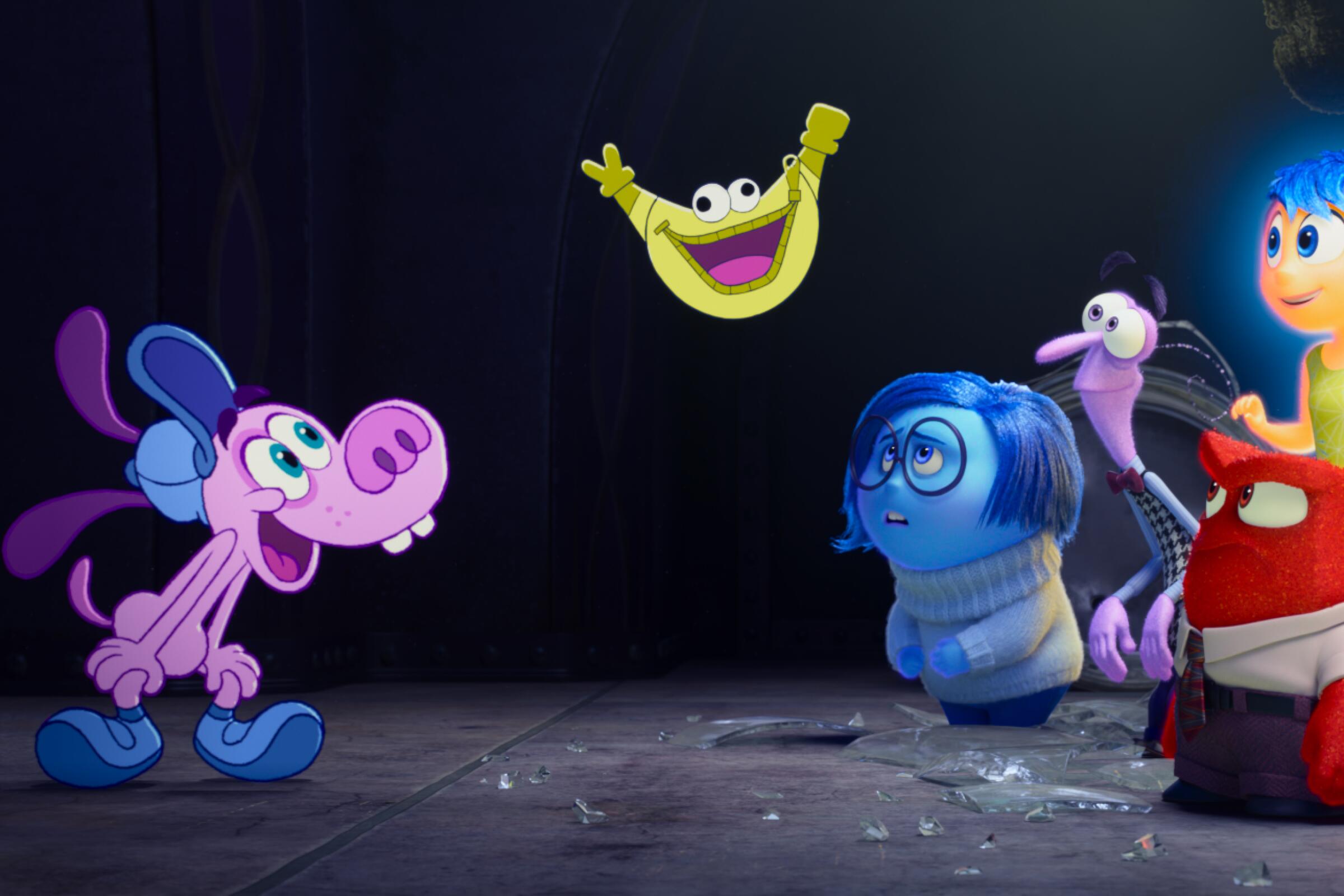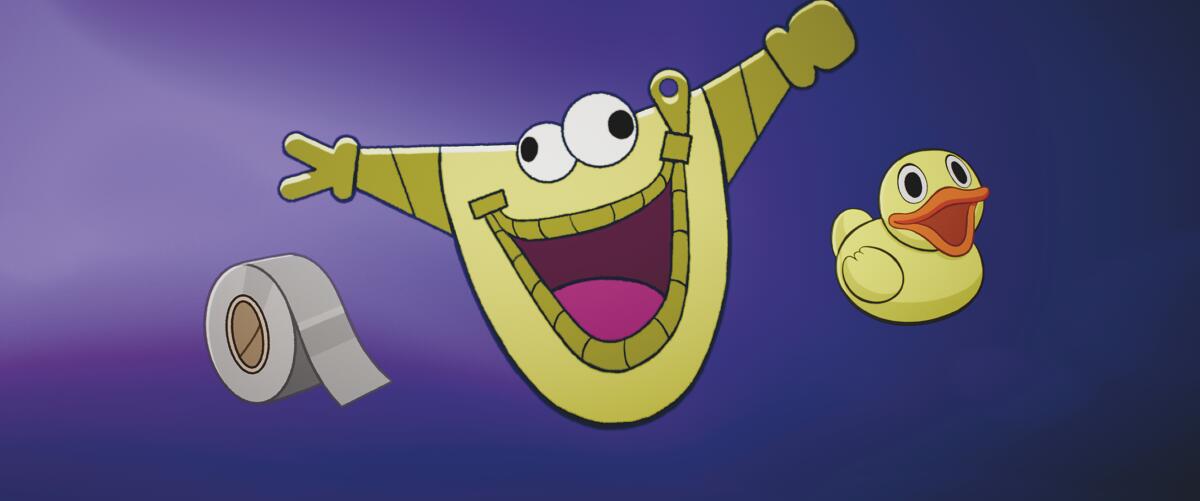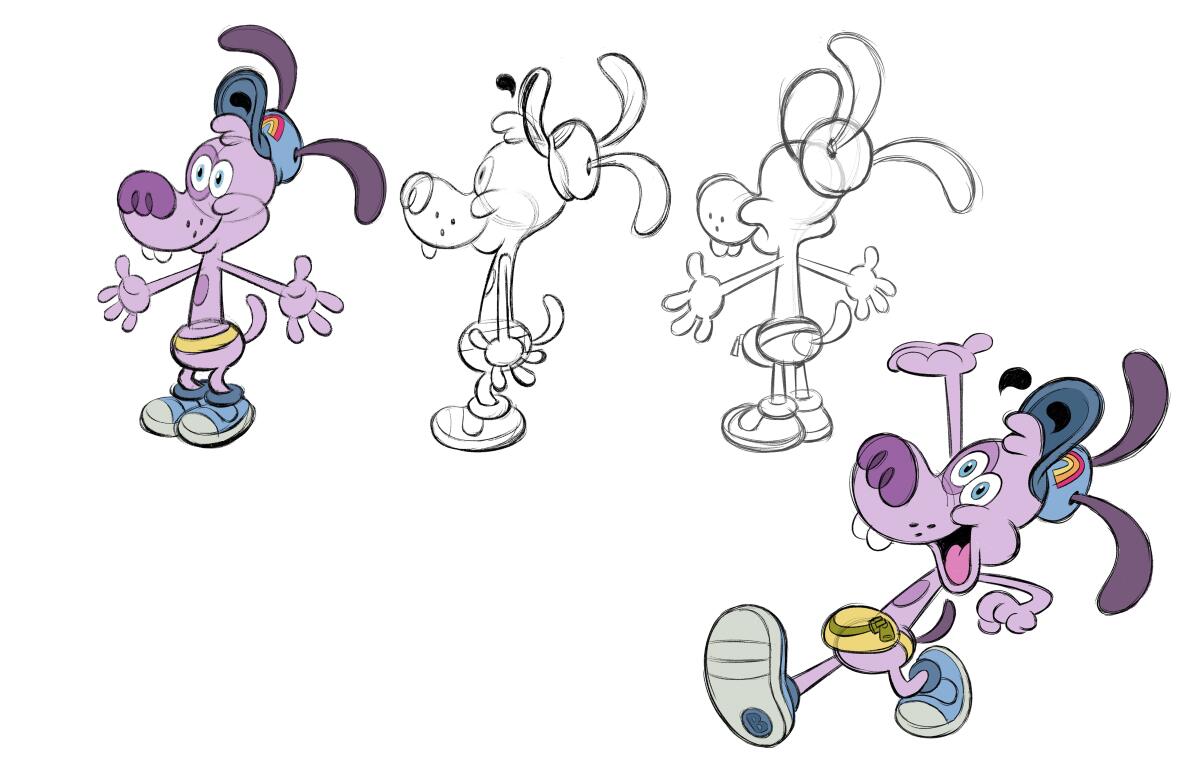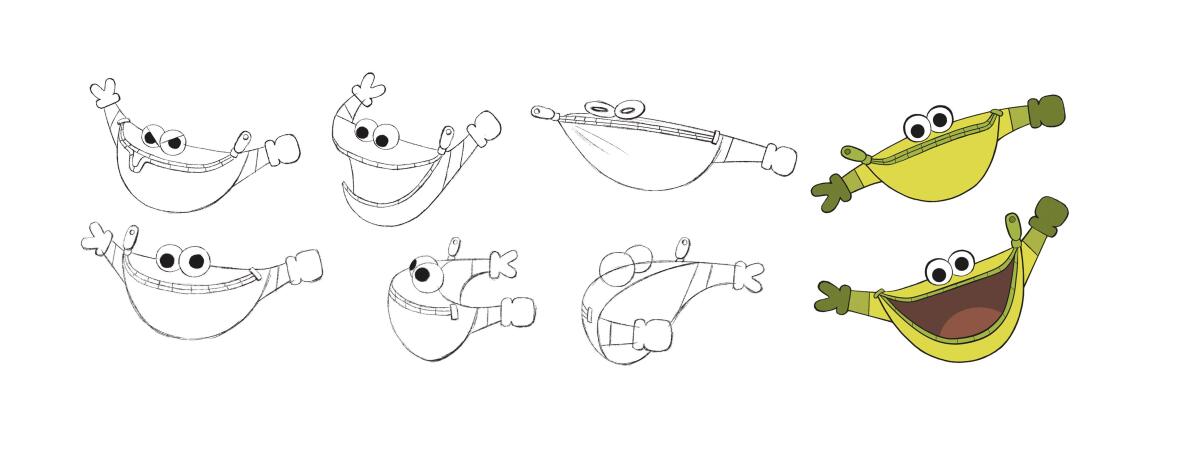Only good movies
Get the Indie Focus newsletter, Mark Olsen's weekly guide to the world of cinema.
You may occasionally receive promotional content from the Los Angeles Times.

Nabbing the biggest opening of the year so far with a monumental domestic gross of $154.2 million, Pixar’s “Inside Out 2” has been a much-needed financial triumph for the lauded animation studio. But even in the wake of such good fortune, Pixar could not have anticipated the wave of laughs that swept over packed screenings with the introduction of two new 2D characters.
Meet Bloofy and Pouchy.
The hand-drawn cartoons are the stars of “Bloofy’s House,” the fictional preschool show tucked away inside the mind of Riley, the sequel’s now-teenage hero, whose head is the setting for much of the movie. Bloofy and Pouchy reside in a vault of secrets: Riley still cherishes these characters from her younger years, but she won’t admit it.
Voiced by comedian Ron Funches, the happy-go-lucky Bloofy is a magenta dog with buck teeth and a surprisingly ironic demeanor, while Pouchy, performed by “Saturday Night Live’s” James Austin Johnson, is his resourceful, sentient fanny pack with a zipper for a mouth who totes sticks of dynamite, among other useful items.

“It took some explaining,” recalls Johnson via Zoom about how the Pixar team approached him to play the expressive waist accessory. “They said, ‘It’s a character who’s got all the tools that they can use to solve the problem.’ I was like, ‘I’m Dora’s backpack. I get it.’”
Funches, 41, who recorded his part in February, says he came on board solely to be involved with Pixar. Upon seeing an image of the character he’d be playing, he knew his sensibility and humor aligned. “With Bloofy, you could see right away that he was wide-eyed and just sweet-natured in the way that he looks,” Funches says.
The actor speaks to me on video from a room in his Los Angeles home that houses several arcade machines.
“I just live like a child who now can afford the things he wants,” says Funches, both about his own game collection (which includes Pac-Man) and about Riley’s relationship to Bloofy as she gets older. “We do ourselves a disservice when we rush to be an adult and get away from those things that bring us so much joy. It’s OK to like those things for longer than other people say you should.”
Inspired by early childhood development shows that break the fourth wall such as “Blue’s Clues” and “Dora the Explorer,” Bloofy and Pouchy were born in a brainstorming session led by director Kelsey Mann.

“Normally at Pixar you iterate a lot, but I’ll be honest, Bloofy came with his fanny pack and he just stayed,” says Meg LeFauve, one of the screenwriters and an Oscar nominee for the first “Inside Out” script.
Mann always knew Bloofy and Pouchy would be done in 2D to best evoke the animated shows they were referencing. The director himself was the temp voice of Bloofy throughout most of the production.
“The look of those shows is very simple, so little kids can easily connect,” says Rob Thompson, the film’s lead “drawover artist” in charge of making expressions more graphic by implementing hand-rendered aesthetics.
“I could say, ‘Dora has way less lines. Can we cut a few of these lines on Bloofy’s shoes or on the hat?’” he recalls. “We would negotiate and find what was important just to get it down to the fewest lines possible to match the style of those shows.” To integrate 2D characters into Pixar’s 3D world, the artists created a digital flat card inside the 3D environment onto which they projected the drawings that give life to Bloofy and Pouchy. Thompson also relied on the lighting department to use shadows to make the mix of techniques look seamless.
Learning that Pouchy would be a traditionally animated character excited Johnson, who has more than a casual interest in animation. “I did postproduction for animation in college and interned for a reboot of ‘Beavis and Butt-Head’ at Mike Judge’s company,” the comedian says.

Pouchy’s voice came together rapidly, Johnson remembers. Knowing that Riley watched “Bloofy’s House” when she was very young, he decided to try a “clownish” voice.
“I have a 2-year-old and I was trying different things out at bath time with him to see what he responded to,” Johnson says. “The voice we have for Pouchy is the one that the director responded to the most. Once you start getting laughs, you just chase that as far as it goes.”
The process was very different from the one Johnson used for his uncanny impersonation of Donald Trump, for which he’s best known.
“The Donald Trump character that I do was years in the making,” he says. “When you’re doing an impression, it’s not just finding a vocal tone or the sound of the voice. It’s finding the mind-set and the joke that you are telling, the story you are telling about the character.”
Johnson was careful not to let his take on Trump seep into Pouchy, a character who has “useful contributions to make” and who “is there to serve,” even if mostly with explosives.
The domestic box office has struggled so far this year, but Disney-Pixar’s hit sequel has given theater owners a much needed chill pill.
Says LeFauve in praise of the “SNL” breakout star, “It sounds easy to just put on a funny voice, but it actually takes some real acting chops to keep it a character, to keep it grounded and yet still be silly and have all the fun, optimism and all those layers that the voice actor had to do.”
What surprised Johnson most is that the majority of people who’ve reached out to congratulate him didn’t recognize his voice at first. “As an actor I want people to know it was me, but perhaps I’m too good at my job as a cartoon voice actor,” he half-jokes.
Bloofy’s limited screen time seems to be having a lasting impact because he appeals both to the younger crowd as well as to older moviegoers — he’s at once comforting and a bit subversive.
“Bloofy’s not just a one-note happy guy,” LeFauve says. “He’s super smart and he is very pointed, but he’s still doing it with a smile in that sing-songy voice.” Is “Bloofy’s House” what Riley was still watching at age 11 when we meet her in the first film? The writer thinks so — and also believes a certain imaginary friend wouldn’t have been pleased.
“I would bet that Bing Bong was a little jealous of Bloofy,” LeFauve speculates.
Pixar stands alone, and “Inside Out” shows you why.
To build his vocal performance, Funches thought about similar characters like Barney, the purple dinosaur, or YouTube sensation Ms. Rachel. (His own 2-year-old is a fan of the latter.) Their defining quality, he thinks, is that they don’t talk down to children. It’s an insight that led him to enunciate clearly, making every word “very poignant and more sing-songy,” he says.
Funches says that his performance as Bloofy sometimes leaned on his own theory that the character had lost his mind in the vault. He enjoys the mature nature of some of Bloofy’s remarks, including his mention of a “quid pro quo” to help him escape.
“He was a weird dog from Chicago,” says Funches. “We kept bringing it up that he was Midwestern and he spoke like, ‘Oh! Hi there! Good to see you!’”
That he’s been able to establish a career in voice acting over the last decade is validating for Funches, who grew up on the south side of Chicago, where he was bullied for his high-pitched voice. He now works with School on Wheels, a program for kids at risk, encouraging them to embrace the weirdness that can set them apart.
“My ex reached out and said that she saw it with her son and that all the kids in the theater were talking back to Bloofy when Bloofy spoke to them,” says Funches. “When you’re in the booth, you don’t know how things are going to go and when you see your work make people happy, it’s something immeasurable to me.”
Given such overwhelmingly positive reaction to the movie, and to his character in particular, Funches hopes there’s a future for Bloofy and Pouchy beyond “Inside Out 2.”
“Why can’t Bloofy be a real show?” asks Funches sincerely. “We can have a fun show for kids that also has a little bit of sharp humor. We got Disney+ right there. Put it on there!”
This week, Brunson, the star and creator of ‘Abbott Elementary,’ performed hosting duties and showed off her comedic versatility.
If a program like that were to exist, maybe we’d also learn what else is Pouchy hiding besides dynamite. Johnson believes that’s what Trump would want to know.
“I thought it was a wonderful film,” he says, doing the ex-president’s voice. “We haven’t seen it. We don’t see it. But it’s a great movie.”
He’s on a roll and we won’t interrupt him. “We’re looking into Pouchy very strongly because this is somebody who is hiding a lot of stuff within himself, and he doesn’t want to let anyone know what it is. We’ve been asking a lot if we can stick our hand inside Pouchy and everyone at Disney said we couldn’t do it, so we don’t do it.”
Audiences, meanwhile, have already cast their cinematic vote. If Disney is listening, we’ll be seeing more of Bloofy and Pouchy.
“Is there anything funnier than when the other emotions look at Bloofy and he is talking to his own shadow on the wall?” asks LeFauve. Viewers would certainly like to find out.
Only good movies
Get the Indie Focus newsletter, Mark Olsen's weekly guide to the world of cinema.
You may occasionally receive promotional content from the Los Angeles Times.